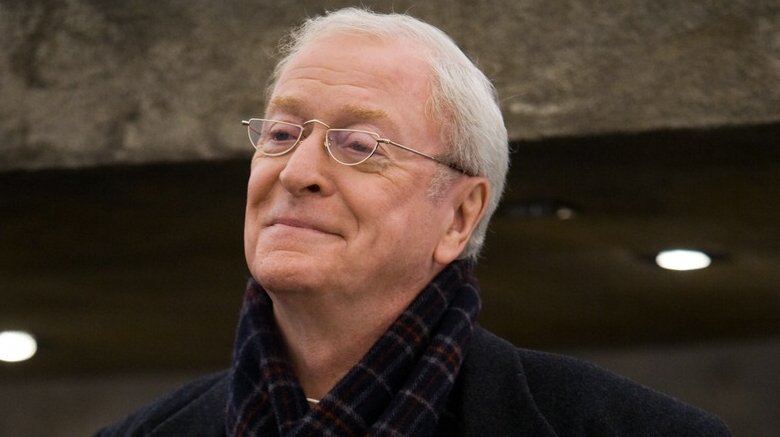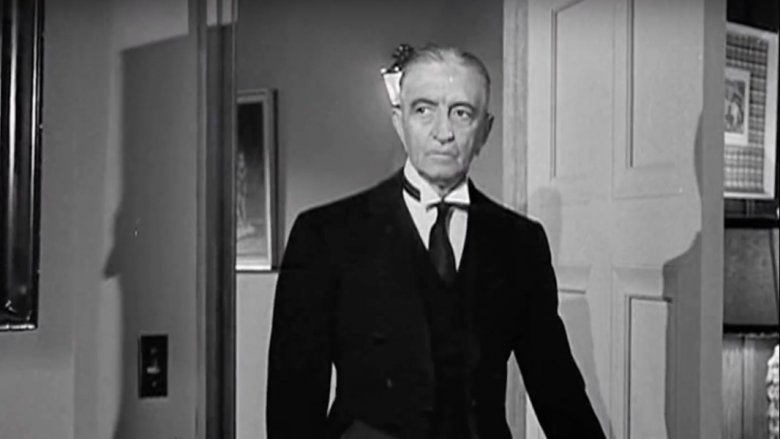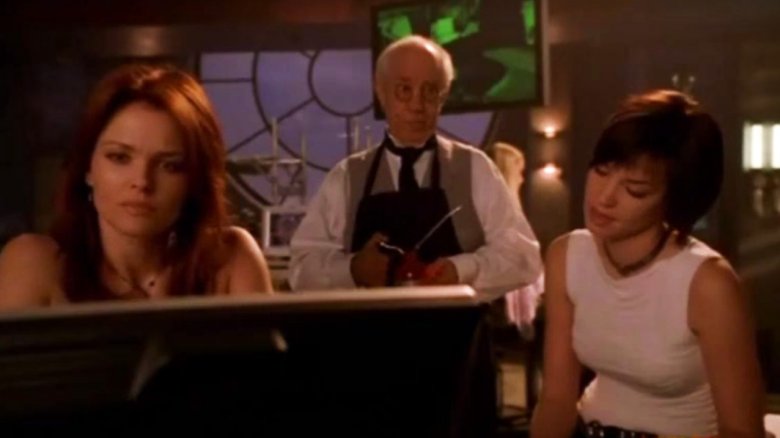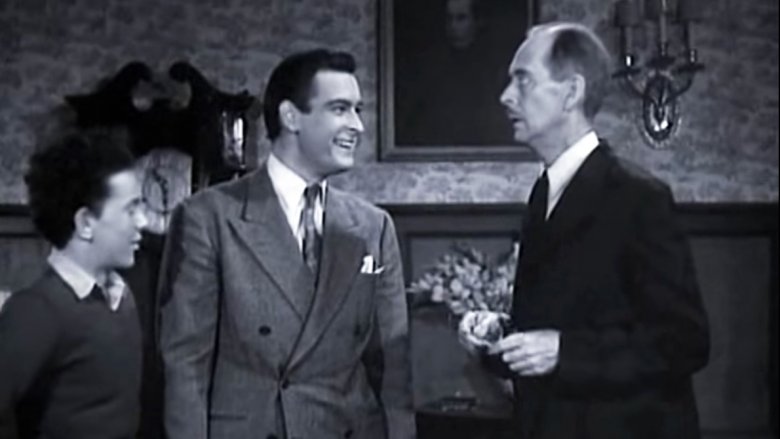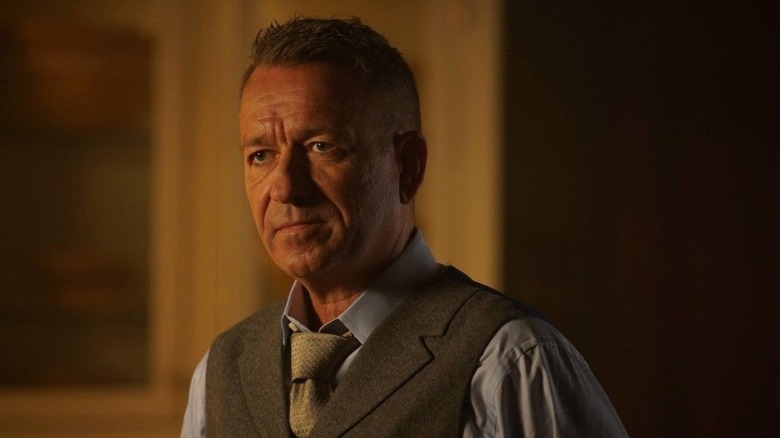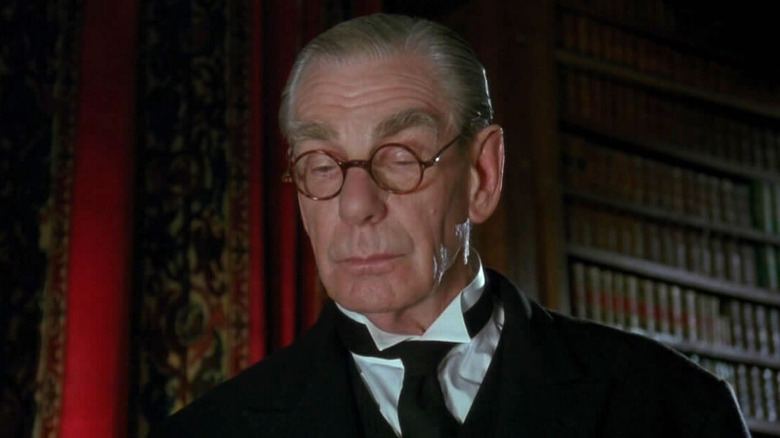Every Version Of Alfred Ranked Worst To Best
While he was originally introduced as comic relief, Alfred Pennyworth has evolved over the years to become one of the most important characters in the entire Batman mythos. He's been a confidant, a mentor, a convenient explanation for who patches the Dark Knight up when he gets shot with a gun shaped like a question mark, and he's even been a villain on a couple of occasions. In fact, he's so important that he's managed to make it into more live-action Batman media than, well, anyone other than Batman himself, including characters like Robin and the Joker.
That said, "important" doesn't always mean "good," and with over 75 years of live-action Alfreds, there are definitely a couple of stinkers in the lineup. Here's a look back at every live-action Alfred, ranked from worst to best!
Eric Wilton (Batman and Robin, 1949)
The 1949 Batman and Robin serial has the distinction of being the first comic book movie sequel ever made and, as film critic Matt Singer puts it, also has the distinction of being the first terrible comic book sequel ever made. To say that it's not good is underselling things by a pretty generous margin. The plot is nonsense, Batman's costume makes him look less like a grim avenger of the night and more like he's wearing the goth version of the bunny suit from A Christmas Story, and it's mind-numbingly repetitive in its quest to fill up a four-hour runtime.
It's even a big step backwards in terms of Batman's butler. While his predecessor, which we'll discuss below, literally changed the entire Batman franchise, Eric Wilton just sort of ... exists. He wears a suit, he speaks with a British accent, and he answers the phone at Wayne Manor—which, incidentally, looks suspiciously like a modest family home in Los Angeles and not the ancestral mansion of one of the country's wealthiest families—and that's about it.
That actually makes Wilton's Alfred pretty difficult to rank, because he's neither good enough to be memorable, nor bad enough to truly deserve the bottom of the barrel. Unfortunately for Wilton, being the most forgettable part of a truly awful Batman movie doesn't do him any favors.
Ian Abercrombie (Birds of Prey)
Looking back, it's pretty clear that the producers of the short-lived 2002 Birds of Prey TV series wanted to build from the foundation of the Tim Burton Batman films. If you need evidence, look no further than the opening of the pilot, when viewers were treated to a flashback featuring the Dark Knight in a version of his costume pulled straight from the 1989 movie, a Catwoman who bore a suspicious resemblance to Michelle Pfeiffer in Batman Returns, and a Gotham City that was apparently lit only by lights hidden behind moody clouds of smoke.
Ian Abercrombie's casting was certainly a part of that. He's not playing Alfred so much as he's playing Michael Gough playing Alfred, stepping into the role that was vacated when Gough retired in 1999. He's certainly not bad in the part, but considering how much of an impression he's asked to do, it's impossible to watch this without comparing the two and finding that Abercrombie comes out worse for it.
And that's a real shame. Abercrombie may not have been a household name, but he's an incredibly talented actor who was well-known to genre fans for solid performances as the Wise Man in Army of Darkness, Emperor Palpatine on the Star Wars: The Clone Wars cartoon, and Green Lantern: The Animated Series, which was almost as short-lived as Birds of Prey. Given the chance to put his own stamp on the role—or more than a single season to work with—Abercrombie certainly could've been a great Alfred. Unfortunately there's a pretty big difference between "could have been" and "was."
William Austin (Batman, 1943)
No one should ever, ever watch the 1943 Batman serial. It's truly awful, grinding away for four and a half hours of a boring and shockingly poorly written plot that finds the Dynamic Duo getting their asses handed to them by nameless thugs before zooming off to another boring sound stage to repeat the process ad nauseam. Even worse, it's staggeringly racist even for 1943, with a yellow peril villain so tasteless that the narrator is inspired to praise the way that "a wise government rounded up the shifty-eyed Japs" in order to keep him in check.
If, however, you do find yourself watching Batman '43, perhaps as punishment for shoplifting or insurance fraud, you can at least look forward to one bright spot: William Austin's portrayal of Alfred. Like his comic book counterpart of the time, he provides a bit of comic relief, both intentionally—by freaking himself out by reading scary detective novels alone in Wayne Manor—and unintentionally, by being tasked with driving Batman and Robin around in what is clearly just Bruce Wayne's convertible with the top put up.
What really sets Austin apart is that he's probably the most influential Alfred of all time. When the character was introduced in the comics, it was as a hefty, clean-shaven caricature of a "gentleman's gentleman." After the serial's debut and almost inexplicable success, however, the Alfred of the comics took some time off for a "holiday at a health resort," and returned to the Batcave sporting a thin, mustachioed new look to match Austin's screen portrayal. While the movies and TV shows to follow would feature a variety of new looks for Alfred, the comics have kept Austin as the standard ever since.
Sean Pertwee (Gotham, 2014)
One of the weirder things to happen to the story of Batman over the years is that we've all just sort of agreed that it makes perfect sense for the family's butler to step in and raise a ten-year-old after his parents are killed. When we see Batman as an adult, Alfred fits so naturally into the role of a surrogate father, it feels like it makes sense, but when you can actually see it in action with a young Bruce Wayne, you can't help but notice that the whole setup is both completely bonkers and possibly illegal. At the very least, it forces the viewer to ask the question of just what it's like to be a parent for someone hell-bent on punching every criminal in the face.
That's what makes Sean Pertwee's performance as Alfred so fun to watch. In what is arguably the weirdest possible version of Bruce Wayne's childhood, Pertwee has to walk a fine line between serving as a father figure and a literal employee, and he actually pulls it off in a way that's compelling and believable. He balances the proper demeanor of the Wayne family butler with hints of his working-class roots and his background as a soldier, showing him as exactly the kind of person who could conceivably raise the kid who would grow up to become the world's greatest crimefighter.
Gotham's take certainly isn't perfect, but Pertwee's performance manages to convey how much Alfred genuinely cares about li'l Bruce, even as he's going through the kind of over-the-top child-rearing struggles that lead to fistfights in the Manor—not to mention all the other weirdness that you get from trying to be a parent in a city where the mayor is a member of a templar death cult. Raising a precocious, vengeance-driven orphan would be tough enough if all you had to worry about was getting to soccer practice on time, let alone having to deal with someone called "The Penguin."
Jeremy Irons (Batman v Superman: Dawn of Justice, 2016)
Casting Jeremy Irons as Alfred Pennyworth is a such a no-brainer that it's shocking it took until 2016 for it to happen.
One of the best things about Alfred is, after all, the fact that he's one of the few characters who can get away with straight up dunking on the Dark Knight at every opportunity, providing support and sarcasm in equal measure. As a crucial part of Batman's mission—and quite possibly the person who cares more about Bruce Wayne than anyone else in the world—he's the only one who can point out how ridiculous everything is without actually making the idea of Batman seem stupid or silly in the context of those stories.
Irons has the perfect voice and attitude to convey that, and when he takes the stage in Batman v Superman, he does it so well that it winds up being one of the best performances in the film. His weariness at being the one who has to maintain anti-Superman armor, rocket cars, and spoooooooky voice changers is a perfect way to underscore the grumpy self-importance that Ben Affleck brings to Batman, and their relationship adds much-needed humanity to the character. In a film as dour and cheerless at this one, the way that Irons plays Alfred isn't just a nice touch—it's necessary.
Michael Gough (Batman, 1989)
He might not be an Academy Award-winner like Jeremy Irons or Michael Caine, but Michael Gough has one achievement that no other Alfred has even come close to: he managed to outlast not one, but three Batmen. Over the course of his tenure in the role, he appeared in four movies, an audio drama, and a handful of advertising campaigns, including one that made the pretty spurious claim that the Caped Crusader was really into Diet Coke.
It's easy to see why he'd have so much longevity. With a voice and demeanor as crisp as his tailored morning coat, Gough was the perfect counterpoint for Tim Burton's vision of a Batman whose eccentricities weren't just limited to, you know, the whole thing where he dresses up as a bat and throws gangsters into chemical vats. Like Jeeves, the archetypal butler of P.G. Wodehouse's Bertie Wooster stories, he was a butler who knew what his employer needed long before the employer did and was as capable of pouring a glass of water before being asked as he was hanging out in the Batcave remixing super-criminal stump speeches.
Unfortunately, Gough's Alfred never really seemed to get the whole "secret identity" thing. In the first movie, he was also a little too eager to lead strange women into the Batcave in hopes that he could marry Bruce off and, presumably, retire to a nice beachfront villa in Santa Prisca, and, by the time we get to the fourth, he's recruiting new crimefighters to join the team without so much as a by-your-leave. That said, he also provides the much-reviled Batman & Robin with a subplot about Alfred contracting a terminal illness that features some genuinely good work, including George Clooney's best moments as Batman. Sure, that might seem like faint praise in a movie that's monumentally goofy at best, but the fact that Gough could lend that much gravitas to a film like that speaks to just how good he was in the role.
Michael Caine (Dark Knight Trilogy, 2005)
If getting Jeremy Irons to play Alfred was a no-brainer, then casting Michael Caine was an idea so perfect that you could almost believe he just showed up on set one day without ever being asked. He fits the role that well. And while Christopher Nolan's three Batman movies are full of bravura performances, Caine is one that the movies simply would not work without.
It's a difficult part to play, too. Caine's Alfred is a man defined by the hope that Batman will stop being Batman. That's tough to pull off, if only because everyone paying to see that movie is in the theater because they either want to like Batman or already do. Having a likable, positive character point out all the flaws in Bruce Wayne's plans—and, in The Dark Knight, pointing out that he's the one whose actions led directly to the Joker showing up and launching a crime spree that involves exploding hospitals and kidnapped love interests—is exactly the kind of thing that could go wrong.
The Alfred of the Dark Knight trilogy, though, never quite gets to that point. He comes close in The Dark Knight Rises, a movie that asks us to be happy about Batman giving up on crimefighting and only sort of succeeds. For the most part, Caine's performance and a script that allows him to be a willing, if skeptical, participant in Wayne's nocturnal adventures just set the stage to make Batman's exploits seem even more brave and bold than they would otherwise.
Alan Napier (Batman, 1966)
The trick with the 1966 Batman television series is that it only really works as long as everyone plays it straight—especially the good guys. It's one of the reasons that Batman himself is depicted as the ultimate square. He has to give the endlessly colorful special guest villains a solid foundation so they can go over the top, and any sly wink to the audience causes the whole thing to collapse. That said, Alan Napier gets to have far more fun than most.
For the most part, his role is to be little more than Batman's steadfast, stentorian receptionist. He's the one who answers the Bat-Phone when Commissioner Gordon and Chief O'Hara call the hotline. In addition to making viewers wonder what would happen if Gordon and O'Hara ever stopped to wonder which prominent Gotham citizens had a proper British butler answering their phone, this allowed the show to feature all those wonderfully bizarre glimpses at Bruce Wayne and Dick Grayson's personal lives, where they're busy with three-dimensional chess or conjugating Latin verbs.
Every now and then, Napier's Alfred got his chance to shine. Over the course of the series, he pulls off a daring rescue while dressed as Batman himself and even manages to be the only member of the team to learn Batgirl's secret identity. And that, in turn, means that he's acting as the secret aide-de-camp to all three crimefighters while keeping their identities secret from the others. No other Alfred pulled that off, and his epic fireplace poker fencing showdown against the Joker in Season 2 is among the best moments the character has had in any medium. Put it all together, and you've got the best live-action Alfred of all time.
